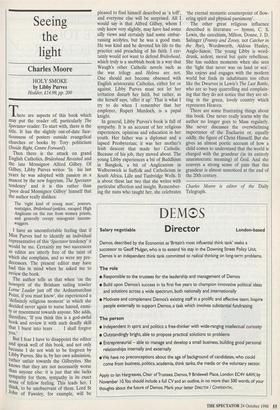Seeing the light
Charles Moore
HOLY SMOKE by Libby Purves Hodder, .04.99, pp. 200 here are aspects of this book which may put the reader off, particularly The Spectator reader. To start with, there is the title. It has the slightly out-of-date face- tiousness of posters outside evangelical churches or books by Tory politicians (Inside Right, Centre Forward).
Then there is the attack on grand English Catholics, Brideshead Revisited and the late Monsignor Alfred Gilbey. Of Gilbey, Libby Purves writes: 'In his last years he was adopted with passion as a mascot by the new fogeyism, The Spectator tendency' and it is this rather than 'poor dead Monsignor Gilbey' himself that the author really dislikes: The 'right kind of young man', poseurs, nostalgics, Brideshead-junkies, escaped High Anglicans on the run from women priests, and generally creepy misogynist incense- waggers.
I have an uncomfortable feeling that if Miss Purves had to identify an individual representative of this 'Spectator tendency' it would be me. Certainly my two successors as editor are utterly free of the taint of Which she complains, and so were my pre- decessors. The present editor may have had this in mind when he asked me to review the book.
The author tells us that when 'on the bowsprit of the Brixham sailing trawler Lorne Leader just off the Ardnamurchan Point, if you must know', she experienced a 'definitely religious moment' in which she decided never again to nurse hatred, enmi- ty or resentment towards anyone. She adds, therefore, 'If you think this is a god-awful book and review it with such deadly skill that I burst into tears . . . I shall forgive You.'
But I fear I have to disappoint the editor and speak well of this book, and not only because I do not wish to be forgiven by Libby Purves. She is, by her own admission, rather unfair towards the Gilbeyites. She knows that they are not necessarily worse than anyone else: it is just that she lacks sYmpathy for them, sympathy in its exact sense of fellow feeling. This leads her, I think, to be unobservant of them. Lord St John of Fawsley, for example, will be pleased to find himself described as 'a toff', and everyone else will be surprised. All I would say is that Alfred Gilbey, whom I only knew very slightly, may have had some silly views and certainly had some embar- rassing acolytes, but he was a good man. He was kind and he devoted his life to the practice and preaching of his faith. I cer- tainly would not want to defend Brideshead, which truly is a snobbish book in a way that Waugh's other Catholic novels such as the war trilogy and Helena are not. One should not become obsessed with English aristocratic Catholics, either for or against. Libby Purves must not let her irritation disturb her faith, but rather, as she herself says, 'offer it up'. That is what I try to do when I remember that her employer, Rupert Murdoch, is a papal knight.
In general, Libby Purves's book is full of sympathy. It is an account of her religious experiences, opinions and education in her youth. Her father was a diplomat and a lapsed Presbyterian; it was her mother's Irish descent that made her Catholic. Because of his job, they moved about. The young Libby experiences a bit of Buddhism in Bangkok, a bit of Anglicanism in Walberswick in Suffolk and Catholicism in South Africa, Lille and Tunbridge Wells. It is about these last two that she writes with particular affection and insight. Remember- ing the nuns who taught her, she celebrates 'the eternal monastic counterpoint of flow- ering spirit and physical parsimony'.
The other great religious influence described is literature — hymns, C. S. Lewis, the catechism, Milton, Donne, J. D. Salinger (Franny and Zooey, not Catcher in the Rye), Wordsworth, Aldous Huxley, Anglo-Saxon. The young Libby is word- drunk, ardent, moral but quite rebellious. She has sudden moments when she sees the 'light that never was on land or sea'. She enjoys and engages with the modern world but finds its inhabitants too often like the Dwarves in Lewis's The Last Battle, who are so busy quarrelling and complain- ing that they do not notice that they are sit- ting in the green, lovely country which represents Heaven.
There are some frustrating things about this book. One never really learns why the author no longer goes to Mass regularly. She never discusses the overwhelming importance of the Eucharist or, equally oddly, the figure of Christ Himself. But she gives an almost poetic account of how a child comes to understand that the world is charged with the grandeur (in its entirely unaristocratic meaning) of God. And she conveys a strong sense of pain that this grandeur is almost unnoticed at the end of the 20th century.
Charles Moore is editor of the Daily Telegraph.


















































































 Previous page
Previous page